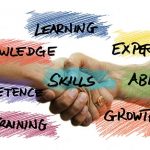Are you tired of feeling like you’re missing out on important social skills? Do you want to know how to effortlessly win friends and influence people? Look no further.
This article is here to teach you the secrets you were never taught. Discover the power of active listening, master nonverbal communication, and develop empathy like never before.
By the end, you’ll be armed with the tools to build trust, resolve conflicts, and leave a lasting positive impression on everyone you meet.
Get ready to transform your social life.
Key Takeaways
 Active listening improves communication and enhances relationships
Active listening improves communication and enhances relationships- Nonverbal communication provides insight into thoughts, feelings, and intentions
- Empathy fosters trust, understanding, and effective communication
- Building rapport through active listening and empathy leads to positive professional relationships
The Power of Active Listening
You should always practice active listening if you want to improve your social skills and make meaningful connections with others. Improving communication and enhancing relationships are crucial goals in both personal and professional settings, and active listening is a powerful tool that can help you achieve these objectives.
Active listening is the process of fully focusing on and understanding the speaker’s message. It involves giving your complete attention, both verbally and non-verbally, to the person speaking. By actively listening, you demonstrate your genuine interest in what the speaker has to say, which fosters a sense of trust and respect. This, in turn, encourages open and honest communication.
One of the key benefits of active listening is that it enhances the quality of your relationships. When you actively listen, you create an environment where others feel heard and valued. This deepens the connection between you and the speaker, leading to more meaningful and fulfilling relationships. Active listening also allows you to truly understand the other person’s perspective, which can help prevent misunderstandings and conflicts.
Furthermore, active listening is an essential skill for improving communication. By paying careful attention to the speaker’s words, tone, and body language, you can better interpret their message. This enables you to respond appropriately and effectively, promoting clear and concise communication. Active listening also helps to minimize distractions, such as interrupting or formulating responses before the speaker has finished, which can hinder effective communication.
Mastering Nonverbal Communication
Pay attention to both verbal and nonverbal cues, as they’re both important in mastering nonverbal communication. Nonverbal communication skills play a crucial role in our daily interactions, sometimes even more so than the words we use. Body language cues can convey a wealth of information, providing insight into a person’s thoughts, feelings, and intentions. By understanding and effectively utilizing nonverbal communication, you can enhance your social interactions, build stronger relationships, and improve your overall communication skills.
One of the key aspects of mastering nonverbal communication is being able to interpret the body language cues of others. This involves paying attention to subtle cues such as facial expressions, hand gestures, posture, and eye contact. These nonverbal cues can reveal a person’s emotions, level of engagement, and even their truthfulness. For example, crossed arms and a furrowed brow may indicate defensiveness or disagreement, while open body language and a genuine smile can convey warmth and friendliness.
In addition to interpreting nonverbal cues, it’s equally important to be mindful of your own body language. Your nonverbal signals can greatly impact how others perceive you and can either enhance or hinder effective communication. Maintaining good posture, making eye contact, and using appropriate hand gestures can convey confidence, attentiveness, and sincerity. Being aware of your body language and making conscious efforts to align it with your verbal message can help you communicate more effectively and build trust with others.
Overall, mastering nonverbal communication skills is a valuable asset in both personal and professional settings. By paying attention to both verbal and nonverbal cues, you can develop a deeper understanding of others and improve your ability to convey your own thoughts and feelings. So, the next time you engage in a conversation, remember to listen with your eyes as well as your ears.
Developing Empathy and Emotional Intelligence
To become more emotionally intelligent, it’s important to actively practice empathy and develop an understanding of others’ perspectives. Developing self-awareness is a crucial step in this process. By taking the time to reflect on your own emotions, thoughts, and behaviors, you can gain a deeper understanding of yourself and how you interact with others. This self-awareness allows you to recognize and manage your own emotions effectively, which is essential for building empathy.
Cultivating compassion is another key aspect of developing empathy and emotional intelligence. Compassion involves not only understanding others’ perspectives but also feeling a genuine concern for their well-being. It requires putting yourself in their shoes, imagining how they might be feeling, and responding with kindness and understanding.
Practicing empathy and cultivating compassion can have numerous benefits in your personal and professional life. In personal relationships, empathy allows you to connect on a deeper level with others, fostering trust and understanding. It can also lead to more effective communication and conflict resolution, as you’re better able to recognize and validate the emotions of others.
In the workplace, empathy and emotional intelligence are highly valued skills. They can enhance your leadership abilities, as you’re able to understand and motivate your team members. Additionally, empathy can improve your ability to collaborate with others, as you’re more attuned to their needs and concerns.
Building Trust and Rapport
The key to building trust and rapport is by actively listening and genuinely engaging in conversations with others. When you take the time to truly listen to someone, it shows that you value their thoughts and opinions. This can lead to a deeper connection and a stronger foundation for building trust and rapport.
To further enhance your ability to build trust and rapport, consider incorporating the following strategies:
Building rapport through storytelling:
- Share personal stories: By opening up and sharing stories from your own experiences, you create a sense of vulnerability and authenticity. This can help others feel more comfortable opening up to you in return.
- Use storytelling to illustrate key points: When engaging in conversations, try using relevant stories to illustrate your ideas. This can make your points more relatable and memorable for others.
Gaining trust through transparency:
- Be open and honest: Transparency is crucial for building trust. Be upfront about your intentions, expectations, and any potential conflicts of interest. This level of honesty will help others feel more comfortable trusting you.
- Admit mistakes and take responsibility: When you make a mistake, own up to it and apologize if necessary. This demonstrates integrity and a willingness to learn and grow, which can strengthen trust in your relationships.
Effective Conflict Resolution Techniques
Have you ever tried addressing conflicts head-on and finding common ground, but still ended up feeling frustrated and stuck?
When it comes to mediating workplace disputes, it can often feel like an uphill battle. However, there are effective conflict resolution techniques that can help you navigate these challenging situations and achieve win-win solutions.
Mediating workplace disputes requires a thoughtful and strategic approach. It involves facilitating open and honest communication between parties, allowing them to express their concerns and perspectives. As a mediator, your role is to remain neutral and unbiased, focusing on understanding the underlying issues and finding common ground.
One key technique in conflict resolution is to encourage active listening. This involves giving each party the opportunity to fully express themselves without interruption, while the other party listens attentively. Active listening helps create a safe and respectful environment, allowing for a deeper understanding of each person’s needs and interests.
Another technique is to identify shared goals and interests. By highlighting the common ground between parties, you can encourage them to work together towards a mutually beneficial solution. This approach shifts the focus from positions to interests, fostering a collaborative mindset and increasing the likelihood of reaching a win-win outcome.
Negotiating win-win solutions requires creativity and flexibility. It involves exploring different options and brainstorming potential solutions that address the concerns of all parties involved. By encouraging open dialogue and exploring alternative perspectives, you can help parties find common ground and reach a resolution that satisfies everyone’s needs.
The Art of Persuasion and Influence
You can effectively use the art of persuasion and influence to sway others to your point of view. Persuasive techniques and influencing strategies can be powerful tools in various aspects of life, from personal relationships to professional endeavors. By mastering these skills, you can enhance your ability to communicate effectively and achieve your desired outcomes.
To help you understand the art of persuasion and influence, consider the following strategies:
Building rapport:
- Establishing a connection with others through active listening and empathy.
- Finding common ground and shared interests to create a sense of unity.
Framing your message:
- Presenting your ideas in a way that appeals to the values and beliefs of your audience.
- Highlighting the benefits and potential positive outcomes that align with their interests.
By using these persuasive techniques and influencing strategies, you can increase the likelihood of gaining support and buy-in from others. However, it’s important to remember that ethical considerations should always be at the forefront of your mind. Manipulation and coercion aren’t effective or sustainable methods of persuasion.
To further enhance your ability to persuade and influence, consider studying the works of influential communicators, such as Dale Carnegie and Robert Cialdini. These experts have explored the psychology behind human behavior and have provided valuable insights into the art of persuasion.
Networking and Building Professional Relationships
To build strong professional relationships, it’s essential to actively network and connect with others in your industry. Developing authentic connections with like-minded professionals can open doors to new opportunities, collaborations, and valuable insights.
In today’s digital age, leveraging social media platforms can significantly enhance your networking efforts. Social media platforms, such as LinkedIn, Twitter, and Instagram, provide the perfect avenue to connect with professionals in your field. These platforms allow you to showcase your expertise, engage in meaningful conversations, and establish yourself as a thought leader.
By actively participating in industry-related groups and discussions, you can attract the attention of influential individuals and build a network of valuable contacts. When using social media for networking purposes, it’s important to be authentic and genuine in your interactions. Avoid using generic templates or automated messages when reaching out to potential connections. Instead, take the time to personalize your messages and show a genuine interest in the other person’s work or achievements. By demonstrating your sincerity, you can foster stronger connections that are more likely to lead to meaningful collaborations or career opportunities.
In addition to social media, it’s crucial to attend industry events, conferences, and meetups to expand your professional network. These face-to-face interactions provide an opportunity to establish genuine connections and leave a lasting impression. Remember to be approachable, listen actively, and show genuine interest in the people you meet. Building relationships based on trust and mutual respect is key to developing a strong professional network.
Networking and building professional relationships require time and effort, but the benefits are invaluable. By leveraging social media and engaging with professionals in your industry, you can develop authentic connections that can propel your career forward and open doors to exciting opportunities. So, start networking actively today and watch your professional network grow.
Leaving a Lasting Positive Impression
Make sure to smile and maintain eye contact when meeting new people, as these small gestures can leave a lasting positive impression. Creating memorable experiences and cultivating a positive mindset are essential skills for building meaningful connections with others.
When you approach new interactions with enthusiasm and a genuine interest in the other person, you can create a lasting impact that goes beyond a simple exchange of pleasantries.
Here are some key strategies to leave a lasting positive impression:
-
Active Listening: Pay attention to what the other person is saying, and show genuine interest by asking follow-up questions. This demonstrates that you value their perspective and makes them feel heard and appreciated.
-
Authenticity: Be yourself and let your true personality shine through. People are drawn to authenticity and are more likely to remember someone who’s genuine and sincere.
- Be present in the conversation and avoid distractions. Show that you’re fully engaged and interested in what the other person is saying.
- Use positive body language, such as open and relaxed postures, to convey friendliness and approachability.
By incorporating these strategies into your interactions, you can create memorable experiences and leave a lasting positive impression. Remember, building connections isn’t just about networking; it’s about fostering genuine relationships based on trust and mutual respect.
Cultivating a positive mindset and genuine interest in others will set you apart and help you establish meaningful connections that can benefit both your personal and professional life. So, smile, maintain eye contact, and approach every interaction with enthusiasm and authenticity.
Frequently Asked Questions
How Can I Effectively Deal With Conflicts in a Professional Setting?
When dealing with conflicts in a professional setting, it’s important to utilize effective conflict resolution techniques.
This involves actively listening to both sides, understanding their perspectives, and finding a common ground for resolution.
Workplace mediation can also be a helpful tool to facilitate open communication and find mutually agreeable solutions.
What Are Some Strategies for Networking and Building Professional Relationships?
Building professional relationships and networking effectively requires building rapport and effective communication skills. It’s like constructing a solid foundation for a building.
To establish strong connections, actively listen to others, show genuine interest, and engage in meaningful conversations. Remember to maintain professionalism, be reliable, and follow up on any commitments made.
Building professional relationships takes time and effort, but the benefits are invaluable for your career growth and success.
How Can I Leave a Lasting Positive Impression on Others?
To leave a lasting positive impression on others, focus on building rapport and utilizing effective nonverbal communication.
Building rapport involves actively listening, showing genuine interest, and finding common ground.
Nonverbal cues such as maintaining eye contact, using open body language, and giving a warm smile can also enhance your impression.
How Can I Enhance My Persuasive Skills and Influence Others?
To enhance your persuasive skills and influence others, start by understanding their perspective and addressing their objections head-on.
Persuasive techniques like storytelling, using evidence, and appealing to emotions can help you make a lasting impact.
Show empathy, actively listen, and build rapport to establish trust.
Develop strong communication skills, such as clear and concise language, confident body language, and active engagement.
What Are Some Techniques for Developing Empathy and Emotional Intelligence?
To develop empathy and emotional intelligence, start by cultivating self-awareness. Take time to reflect on your own emotions and how they may impact your interactions with others.
Additionally, work on actively listening to others. This means giving them your full attention, asking open-ended questions, and showing genuine interest in their perspective.
Conclusion
Mastering the often overlooked social skills can truly transform your relationships and interactions.
By actively listening, using nonverbal cues effectively, and developing empathy, you can build trust and rapport with others.
Additionally, effective conflict resolution techniques, the art of persuasion, and networking skills can help you leave a lasting positive impression on those you encounter.
These skills may seem small, but their impact is immense, making them the keys to winning friends and influencing people.








